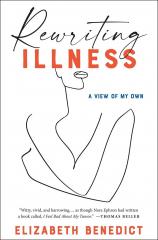Rewriting Illness: A View of My Own
Review
Rewriting Illness: A View of My Own
Why do people say “full disclosure?” Isn’t “disclosure” sufficient? Here’s mine: I know Elizabeth Benedict slightly. Every Mother’s Day, I recommend her book, WHAT MY MOTHER GAVE ME: Thirty-One Women on the Gifts That Mattered Most. In a piece about REWRITING ILLNESS: A View of My Own, she writes that “a notably blunt friend” --- that’s me --- said something that mattered, which, of course, the notably blunt friend didn’t recall. As she writes:
I called a notably blunt friend about another matter and ended up telling him about the book. “What’s the title?” he said. When I braved repeating it, I could practically hear him shaking his head. “No, that won’t work. How long are your chapters?” When I told him, another slam: “That won’t work either. If this is a book for people with cancer, they don’t want to read long. I’m writing a book now with no chapter longer than 900 words. And some much shorter.”
"Short chapters with snappy titles...transform a book about illness and recovery into a thriller."
Her short chapters paid off. So did the sassy chapter titles. You can whip through REWRITING ILLNESS in an evening. Short chapters with snappy titles --- “Not Everything Scares the Sh-t Out of Me” and “Maybe It Was the Krazy Glue,” and “What Brings You Here Today?” and “Where Is My Husband?”--- transform a book about illness and recovery into a thriller. Shhhh. Don’t tell the others.
In the senior lounge at the Lenox School in Manhattan, where classes were small and students were “taught by women with the luxury to engage in subjects they had studied at Vassar and Bryn Mawr,” Susan Briskman complained about a lump on the underside of her chin. A month later, she was diagnosed with Hodgkin’s disease. A few more months, and she was dead, at 17.
Elizabeth Benedict was in the school library. When the news reached her, she staggered upstairs. Sue’s death “rewired my entire nervous system, made me leap with fear at every bodily symptom and a good proportion of my medical encounters. From then on, my brain told me I had to be vigilant, always on guard against the slightest anomaly.”
Forty years later, 10 Lenox graduates gathered. Elizabeth asked, “Has anyone been haunted by Sue’s death?” There was “barely a flutter. No one mentioned a single lingering effect.”
Five years later, on June 9, 2017, shortly after saying goodnight to a dear young friend who had come for dinner, Elizabeth crossed her left arm over her chest and stuck it in her armpit, and there it was. She knew in an instant that it could be gravely dangerous. She googled “reasons lump armpit.” It could be a cyst, temporarily swollen lymph glands, lymphoma or a warning sign that breast cancer was on its way. “The news was either pretty good, not great, or Get Your Affairs in Order.”
We are now 12 pages into REWRITING ILLNESS. She auditions Google’s list of natural remedies. She does jumping jacks, drinks apple cider vinegar and tries Tibetan Buddhist chanting. A lazy doctor calls the lump “a reactive lymph node” without scheduling a biopsy and reluctantly refers her to a breast specialist “if it would help your anxiety.” Three months and 10 days after she first consulted a doctor, a better doctor tells her she has non-Hodgkin’s lymphoma and gives her the name of the doctor who heads the hospital’s lymphoma treatment. His directive is an arrow: “You should call him right away.” That doctor has no appointments for two months.
When she takes a friend’s advice and cold calls a legendary lymphoma doctor --- who calls her back that night --- he soon reviews genetic tests and reports, “You are positive for a gene that makes you less responsive to the chemo.” Even he is uncertain how to treat her, but for starters, he sends her for six days of round-the-clock chemo at the same hospital where Nora Ephron was treated and died, which she finds strangely comforting.
Good books, Elizabeth Benedict has written, have two stories going on at once. Here there are more. One involves her husband, who needs to be cloned so other women can benefit from his confidence and calm. One has the patient taking charge, becoming the heroine of her own story. A third is about her legendary doctor, who pitches her book ideas about left-handed people and people with red hair before announcing, “I think you’re going to be fine.” Each gets a brisk chapter, as we move, steadily, toward a cure.
Elizabeth Benedict’s first draft was 250 pages. The finished book is 204. How could I not adore it?
Reviewed by Jesse Kornbluth for HeadButler.com on June 3, 2023
Rewriting Illness: A View of My Own
- Publication Date: May 23, 2023
- Genres: Memoir, Nonfiction
- Paperback: 216 pages
- Publisher: Mandel Vilar Press
- ISBN-10: 1942134916
- ISBN-13: 9781942134916




